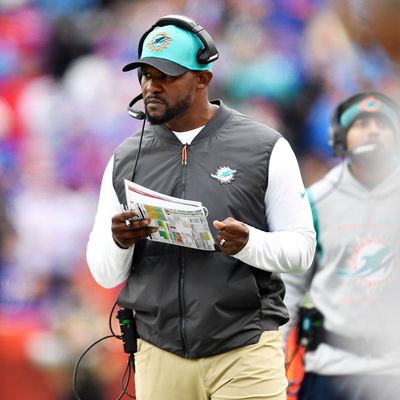
Brian Flores, the Black former Miami Dolphins head coach, is suing the NFL for discriminatory hiring practices. The lawsuit was set in motion, he said, by text messages he got in January from Bill Belichick, the New England Patriots head coach and Flores’s former boss, when Flores was trying to get a new job with the New York Giants. “I hear from Buffalo and NYG that you are their guy,” one of Belichick’s messages read. His congratulations were a mistake, however, meant for a different Brian — Daboll, who is white — also shortlisted to be the Giants’ next head coach. It soon became clear that Daboll had already been interviewed and had accepted the team’s offer. But Flores was still scheduled to meet with the Giants — a “sham” interview, Flores concluded, to prove that the team had spoken with a Black candidate, too.
In Flores’s view, this setup fit a pattern. A policy called the Rooney Rule, in place since 2003, requires NFL teams to interview at least two ethnic-minority candidates for open head-coach positions. Several nonwhite coaches were hired in its wake, but their ranks have plummeted in recent years, and many Black coaches now see the policy as cover for teams that don’t actually intend to give them a shot. So Flores is trying to attach legal consequences to one of NFL’s most durable features — its racism — by targeting a rule that was designed to offer it plausible deniability against this exact type of allegation. And he’s doing so despite the obvious consequences. “I may be risking coaching the game that I love and that has done so much for my family and me,” Flores said in a statement, according to the New York Times.
The crusade has earned him plaudits for bravery — “Thank you, Brian Flores” was an instant refrain on social media when the news broke — while earning further damnation for the club he’s trying to diversify. League management’s record on race speaks for itself. In a settlement in October, the NFL agreed to stop “race-norming” its dementia-claim payouts (it had been determining whether former players were eligible using a scale that assumed Black people had lower cognitive function than white people). The preceding five years had seen the blackballing of Colin Kaepernick. After he started protesting against police violence and racism, the ex–San Francisco 49ers quarterback was denied roster spots on every team, despite clearly being qualified.
The impotence of the Rooney Rule — it simply “isn’t working,” as ESPN analyst Mina Kimes put it — is thus consistent with an organization that’s rarely been required to be more than cosmetically nonracist. Three NFL head coaches weren’t white in 2003. In 2020, that number was the same. Seventy percent of NFL players are Black.
But if Belichick’s texts are the closest thing Flores has to a smoking gun, his legal task will be Sisyphean. He says 40 other coaches may join his class-action lawsuit, though they remain unnamed. Even together, they’ll face steep odds.
And what if they were to succeed? Should nonwhite coaches start to break through in larger numbers, it’s crucial to understand the world they would be entering. Flores’s time in Miami lends some insight. The relationship he describes with Dolphins owner Stephen Ross suggests an ethical bankruptcy that diversity wouldn’t fix. Flores alleges, in Tuesday’s filing, that Ross pressured him to “tank” the 2019 season — i.e., to lose as many games as possible — to increase the team’s odds of getting a high draft pick. He claims Ross offered him $100,000 for every game he lost and got mad whenever he won, according to the Times. The Dolphins, like the NFL, have denied Flores’s charges.
In a separate incident, Flores alleges that Ross urged him to violate the league’s tampering rules by recruiting another quarterback. After Flores declined, Ross invited the coach to lunch on a yacht; Flores left when Ross revealed that the quarterback was coming, too.
Such pressures are almost certainly exerted on white coaches as well as nonwhite ones — that is to say, these dynamics persist where unscrupulous billionaires do. And the NFL is their playground. The merits of racial inclusiveness in such an arena are far from self-evident as long as the primacy of such men goes undisturbed. For all of Flores’s personal tenacity, the question that has haunted the successes of Black professionals for decades retains its urgency with his lawsuit: whether the most durable accomplishment of the civil-rights era was to facilitate their access to racist institutions. This doesn’t have to be the case. But making sure of that requires us being clear-eyed about what people like Brian Flores can accomplish and what their success would and wouldn’t change.






























